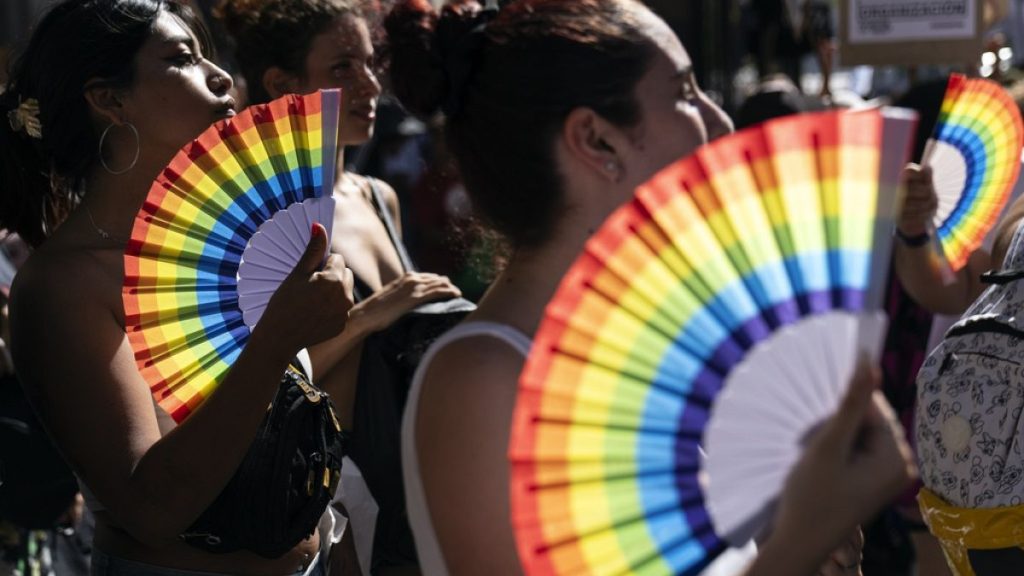The streets of Buenos Aires and other major Argentinian cities erupted in protest following President Javier Milei’s controversial pronouncements at the World Economic Forum in Davos. Milei’s speech, a diatribe against what he termed “sick wokeism,” sparked widespread outrage and mobilized thousands to defend social progress and human rights. His denouncement of social welfare, feminism, identity politics, and climate change activism, coupled with his inflammatory equation of gender ideology with child abuse and homosexuality with paedophilia, ignited a firestorm of criticism and fueled fears of a regressive turn in Argentina’s social landscape. The proposed removal of femicide from the penal code further intensified the backlash, raising alarms about the potential erosion of protections for women in a country grappling with persistent gender-based violence.
The protests, a vibrant display of rainbow flags and banners proclaiming “rights are not negotiable,” were a direct response to Milei’s rhetoric and policies. Dubbed the “Federal March of Anti-Fascist and Anti-Racist Pride,” the demonstrations were spearheaded by the LGBTQ+ community, who felt particularly targeted by the president’s pronouncements. They were joined by a diverse coalition of rights groups, unions, and political parties, united in their opposition to what they perceived as an assault on fundamental human rights and democratic values. The dismantling of the Ministry of Women’s Affairs, a move that left hundreds unemployed and numerous victims of gender-based violence without institutional support, further solidified the perception of an administration hostile to social justice and equality.
The protesters voiced deep concern over the direction of the country under Milei’s leadership. They criticized his administration’s focus on dismantling progressive social policies while neglecting vital public services like healthcare and education. The president’s attacks on personal freedoms and his dismissive attitude towards the concerns of marginalized communities were seen as a dangerous erosion of democratic principles. The protesters’ anxieties extended beyond the immediate impact of Milei’s words and actions, encompassing a broader fear of a return to a more oppressive and discriminatory past.
The demonstrations underscored the significant strides Argentina has made in recent decades towards enshrining human rights and promoting social inclusion. The country’s legalization of same-sex marriage and its progressive legislation on sexual diversity are testaments to this progress. The protests served as a powerful reminder of the ongoing struggle to protect these hard-won gains and to resist attempts to roll back the clock on social progress. The outpouring of public resistance signaled a determination to uphold the values of equality, diversity, and social justice in the face of a political climate perceived as increasingly hostile to these principles.
For many protesters, the demonstrations were not just about opposing Milei’s policies but also about defending the very essence of their identity and their right to exist freely and without fear. The comparison of homosexuality to paedophilia was particularly hurtful and deeply offensive to the LGBTQ+ community, reinforcing harmful stereotypes and perpetuating discrimination. The proposed removal of femicide from the penal code was seen as a direct threat to women’s safety and a chilling disregard for the pervasive problem of gender-based violence.
Milei’s actions and rhetoric have created a deep schism in Argentine society, pitting those who embrace his vision of a smaller, less interventionist state against those who believe in the importance of social safety nets and the protection of vulnerable populations. The protests represent a powerful voice of dissent, a declaration that the fight for human rights and social justice is far from over. They are a testament to the resilience and determination of Argentinians to uphold the values of a more inclusive and equitable society, a society that recognizes the dignity and worth of all its citizens. The future of Argentina hangs in the balance, and the ongoing struggle between these opposing visions will undoubtedly shape the country’s trajectory for years to come.














